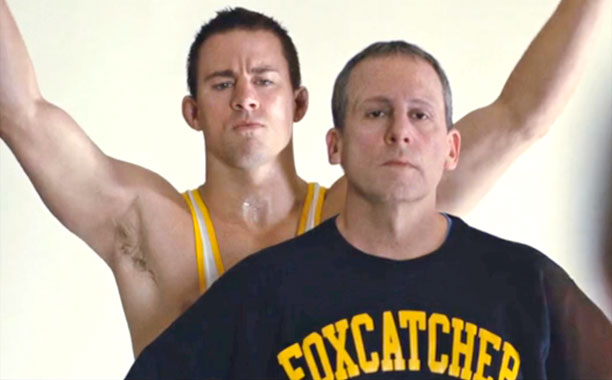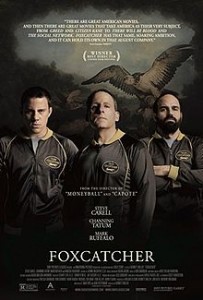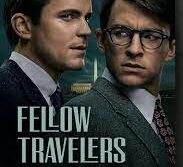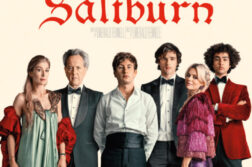IN THE DOCUMENTARY The Celluloid Closet (1995), Arthur Laurents memorably observes that “minority audiences watch films with hope. … That’s why nobody really sees the same movie.” His observation speaks to the subjective nature of interpretation. Bennett Miller’s Foxcatcher validates this truism on a number of levels. The protagonist’s desire is unmistakably the central conflict, but the exact nature of that desire is a kind of Rorschach test for moviegoers, who in their efforts to define it are expressing desires of their own.
Foxcatcher is an unconventional buddy film in which John du Pont (Steve Carell) taps B-list wrestler Mark Schultz (Channing Tatum) to move into a guesthouse on his Pennsylvania estate to benefit from the tycoon’s massive resources and to take the U.S. Olympic team to new heights. Based on a true story, the film deploys multiple subtexts for du Pont’s motive, the first being patriotism. The two men share an ethos about God and country, a familiar refrain for competitors in most international events. Winning is never just about athletic prowess but is also a product of one’s internal telos moving in romantic slow motion toward manifest destiny. Du Pont wants his personal fortune to be further validated by the myth of national ascendency, a myth in which he casts himself as the leading man. Olympic sport becomes the proving ground for the exercise not just of a team but of his own will.
But other subtexts are waiting in the wings. Du Pont wants to prove his state-sanctioned might to the Russians and the global community, but also and perhaps more importantly to his own mother. Steve Carell, poised to become an award-season darling, delivers what might be the defining performance of his career. As with Tom Hanks before him, Carell’s comic roots throw this astounding dramatic performance into stark relief, most especially when he’s acting against the du Pont matriarch, played in ice-queen fashion by Vanessa Redgrave. Rattling through the rooms of their mansion and looking upon him with disfavor seems to be her only purpose in life, a purpose she embraces with unswerving dedication.
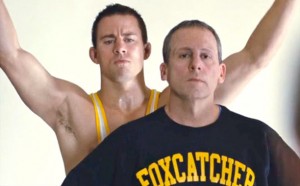
Like all cinematic buddies, John and Mark are a superficial study in contrasts, but beneath the skin they have everything in common and complement each other perfectly. Mark is a pillar of aching manhood who, one would think, never met a jar or a pair of pants he couldn’t wrest open. But the film depicts him as a loveless, insecure second fiddle to his more decorated brother Dave, also an Olympic wrestler whose respect Mark is never convinced he has earned. When the film opens, Mark is making ends meet through twenty-dollar speaking engagements, which pay for meals he consumes in the front seat of his car. John is a stubby gargoyle whose successes on the senior wrestling circuit come through payoffs slipped discreetly into the palms of his opponents by his henchmen when John’s back is turned. Mark, muscular but powerless, and John, affluent but hunchbacked, have a lot to offer each other.
In fact, the two bring to mind the sexually fluid odd couple of Joe Buck and Ratso Rizzo in Midnight Cowboy (1969), bringing us to the film’s most cryptic subtext: what do these men really want from each other? Is John’s motive just his own jingoism, or his noblesse oblige, or the insecurity of a son whose mother never loved him? Or is it that, after all, when he looks at Channing-as-Mark in a wrestling singlet covering everything and nothing, he sees what the rest of us see? That last tantalizing possibility floats ambiguously in a scene at the exact midpoint of the film. Rousting him from bed, John summons Mark for an impromptu midnight practice match, shot in soft focus and low-key light. Mark is spread-eagled on the mat, and John is gripping him from behind, showing Mark some “wrestling techniques” that the filmmaker never lets us see. For some audiences, perhaps this says all. But this is one form of unstated desire among many in his life that John gratifies through hostile takeover because he knows that no one cares enough about him to consent any other way.
The final turning point occurs with John in his living room watching “documentaries” about himself. These films are obvious propaganda pieces, no more real than John’s paid-for victories in the ring. Like Laurents, John watches these films with a desire that no one on his payroll can quite satisfy. And instead of freeing him, his mother’s eventual death seems to place whatever affirmation he needs permanently out of his reach, a recognition to which he succumbs at the end of the film, with lethal results.
J. Ken Stuckey is a senior lecturer in English and media studies at Bentley University.


